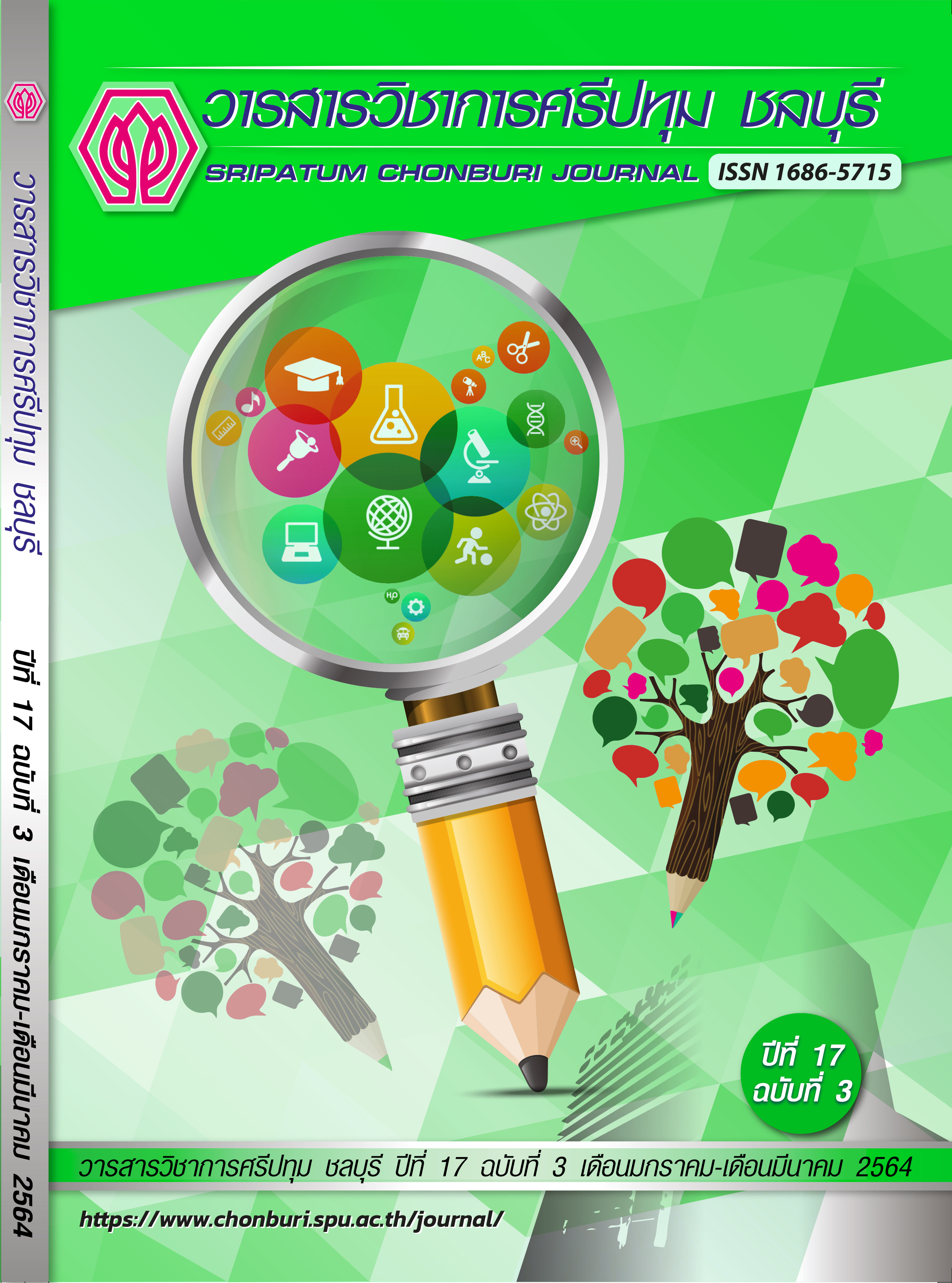THE EFFECT OF SPIRITUAL HEALTH PROMOTION PROGRAM ON SPIRITUAL WELL-BEING IN NURSING STUDENTS
Keywords:
spiritual health promotion, spiritual well-being, nursing students.Abstract
This quasi-experimental research aimed to examine the effect of a spiritual health promotion program on the spiritual well-being of nursing students. The 1st nursing students of Boromarajonani college of nursing, Songkhla were selected by multi-stage sampling and randomly allocated to an experimental group (n = 40) or a control group (n = 40). The experimental group received the spiritual health promotion program for a period of 4 weeks. The control group received the normal care. The instruments used in this study consisted of 2 parts; 1) experimental instrument, which was the spiritual health promotion program; and 2) the instruments for data collection, which included a demographic data form and the spiritual well-being questionnaire. The questionnaire using Cronbach’ alpha coefficient, which yielded the value of .86. Demographic data were analyzed using descriptive statistics and chi-square. The mean scores of spiritual well-being pretest and posttest in the experimental group were analyzed using paired t-test. The mean scores of spiritual well-being between the experimental group and the control group were analyzed using independent t-test. The results revealed that the mean scores of spiritual well-being in the experimental group was significantly higher at posttest than at pretest. The mean posttest scores of spiritual well-being in the experimental group was significantly higher than that of the control group and the spiritual well-being promotion’s experience occurred in the experimental group. Findings of the study indicate that the effect of a spiritual health promotion program affected the spiritual well-being of nursing students higher than normal caring, so the nursing educational institution could be chosen this program to develop spiritual well-being for The 1st nursing students and to integrate in learning and teaching so that spiritual health promotion of nursing students continuously.
References
ทัศนีย์ ทองประทีป. (2552). จิตวิญญาณมิติหนึ่งของการพยาบาล. กรุงเทพฯ: สำนักพิมพ์แห่งจุฬาลงกรณ์มหาวิทยาลัย.
ธนพล บรรดาศักดิ์, กนกอร ชาวเวียง และนฤมล จันทรเกษม. (2561). การศึกษาความฉลาดทางจิตวิญญาณของนักศึกษาพยาบาล. วารสารวิชาการศรีปทุม ชลบุรี, 14(3), หน้า 48-55.
ธนา นิลชัยโกวิทย์ และอดิศร จันทรสุข. (2552). ศิลปะการจัดกระบวนการเรียนรู้เพื่อการเปลี่ยนแปลง: คู่มือกระบวนการจิตตปัญญาศึกษา. กรุงเทพฯ: เอส พี เอ็น การพิมพ์.
นฤมล อเนกวิทย์. (2552). การพัฒนาหลักสูตรจิตตปัญญาศึกษาสำหรับนักศึกษาพยาบาล. วิทยานิพนธ์ศึกษาศาสตรดุษฎีบัณฑิต สาขาวิชาหลักสูตรและการสอน, บัณฑิตวิทยาลัย มหาวิทยาลัยขอนแก่น.
ประเวศ วะสี. (2547). ธรรมชาติของสรรพสิ่ง: การเข้าถึงความจริงทั้งหมด. กรุงเทพฯ: มูลนิธิสดศรี-สฤษดิ์วงศ์.
_______. (2550). ระบบการเรียนรู้ใหม่ ไปให้พ้นวิกฤตแห่งยุคสมัย. กรุงเทพฯ: สวนเงินมีมา.
ปวิดา โพธิ์ทอง, สุพัตรา พุ่มพวง และสุนทรี ขะชาตย์. (2554). ความเครียด การปรับตัว และความฉลาดทางอารมณ์ของนักศึกษาพยาบาลชั้นปีที่ 1 วิทยาลัยพยาบาลบรมราชชนนี สุพรรณบุรี. วารสารวิทยาลัยพยาบาลพระปกเกล้า จันทบุรี, 22(2), หน้า 1-14.
ปาริชาต ชูประดิษฐ์. (2556). การพัฒนาสุขภาวะทางจิตวิญญาณสำหรับนักศึกษาพยาบาล วิทยาลัยพยาบาล สังกัดสถาบันพระบรมราชชนก กระทรวงสาธารณสุข. วิทยานิพนธ์ปรัชญาดุษฎีบัณฑิต สาขาวิชาบริหารศาสตร์, วิทยาลัยบริหารศาสตร์ มหาวิทยาลัยแม่โจ้.
พระราชบัญญัติสุขภาพแห่งชาติ พ.ศ. 2550 (ออนไลน์). (2550). เข้าถึงได้จาก: https://www.dms.go.th/
backend//Content/Content_File/Information_Center/Attach/25621124013609AM_17.pdf [2561, 9 สิงหาคม].
มณี อาภานันทิกุล, พรรณวดี พุธวัฒนะ และจริยา วิทยะศุภร. (2554). ภาวะสุขภาพและการปฏิบัติตัวด้านสุขภาพของนักศึกษาพยาบาลไทย. วารสารสภาการพยาบาล, 26(4), หน้า 123-136.
วรรณา คงสุริยะนาวิน และเสาวลักษณ์ จิรธรรมคุณ. (2554). ผลของกลุ่มจิตสัมพันธ์เพื่อการส่งเสริมสุขภาพจิตของผู้นำนักศึกษาพยาบาล. วารสารสภาการพยาบาล, 26 (ฉบับพิเศษ), หน้า 126-139.
วรวรรณ จันทวีเมือง. (2559). ผลของโปรแกรมจิตตปัญญาศึกษาต่อสุขภาวะจิตวิญญาณของนักศึกษาพยาบาล. วิทยานิพนธ์พยาบาลศาสตรมหาบัณฑิต สาขาวิชาการพยาบาลเวชปฏิบัติชุมชน, บัณฑิตวิทยาลัย มหาวิทยาลัยสงขลานครินทร์.
วรินทร์ลดา จันทวีเมือง, กาญจน์สุนภัส บาลทิพย์ และอุษณีย์ เพชรรัชตะชาติ. (2561). ผลของโปรแกรมจิตตปัญญาศึกษาต่อสุขภาวะจิตวิญญาณของนักศึกษาพยาบาล. วารสารพยาบาลศาสตร์ มหาวิทยาลัยสยาม, 19(37), หน้า 84-102.
วิจักษณ์ พาณิช. (2550). การเรียนรู้ด้วยใจอย่างใคร่ครวญ: การศึกษาดั่งเส้นทางแสวงหาทางจิตวิญญาณ. กรุงเทพฯ: สวนเงินมีมา.
วิลาวัลย์ โพธิ์ทอง. (2560). การจัดการเรียนรู้โดยสอดแทรกกระบวนการจิตตปัญญาศึกษาในรายวิชา การจัดการชั้นเรียนและสิ่งแวดล้อมเพื่อการเรียนรู้ เพื่อเสริมสร้างสติและสมาธิที่เกิดการเปลี่ยนแปลงขั้นพื้นฐาน. จันทรเกษมสาร, 23(45), หน้า 113-127.
สุวิริยา สุวรรณโคตร และนีออน พิญประดิษฐ์. (2556). การพัฒนาหลักสูตรส่งเสริมความสามารถในการดูแลผู้ป่วยระยะสุดท้ายในมิติจิตวิญญาณและคุณค่าความเป็นมนุษย์ตามแนวคิดจิตตปัญญาศึกษาสำหรับนักศึกษาพยาบาล. วารสารศึกษาศาสตร์ฉบับวิจัยบัณฑิตศึกษา มหาวิทยาลัยขอนแก่น, 7(1), หน้า 227-235.
Cohen, J. (1988). Statistical power analysis for the behavioral sciences (2nd ed.). Hillsdale, NJ: Erlbaum.
Nardi, D., & Rooda, L. (2011). Spiritual-based nursing practice by nursing students: An exploratory study. Professional Nursing, 27(4), pp. 255-263.
Park, K. B., & Calamaro, C. (2013). A systematic review of social networking sites: Innovative platforms for health research targeting adolescent and young adults. Nursing Scholarship, 45(3), pp. 256-264.
Polit, D. F. (2010). Statistics and data analysis for nursing research (2nd ed.). Upper Saddle River, NJ: Pearson.
Tower, M., Latimer, S., & Hewitt, J. (2014). Social networking as a learning tool: Nursing students perception. Nurse Education Today, 34(6), pp. 1012-1017.
Downloads
Published
Issue
Section
License
บทความทุกบทความเป็นลิขสิทธิ์ของวารสารวิชาการศรีปทุม ชลบุรี



